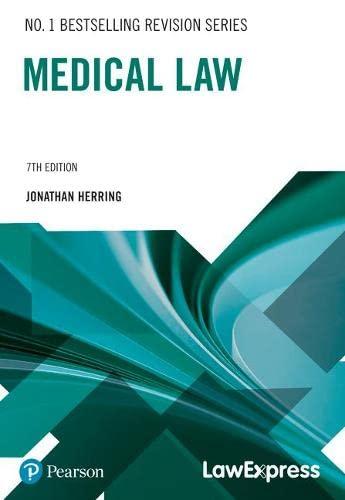Question
1. By definition, discretion is the power of a judge, public official, or private party to act according to the dictates of their own judgement
1. By definition, discretion is "the power of a judge, public official, or private party to act according to the dictates of their own judgement and conscience within general legal principles." The judge and attorneys use their own discretion for acts performed under legality. Each person follows their own role's points. For example, district attorneys have discretion over if a case is charged or not. Meanwhile, judges have discretion over the sentencing of a crime. They have their own discretion in their own jobs. A judge cannot decide to not charge a case, that is out of their discretion. Discretion is very important in the criminal justice system.
The law is not ultra specific about cases since there are so many, and therefore discretion must be acted upon to swiftly ensure punishment or release of the accused. People may not have the time to ask their superior how they should handle a situation (if they have a superior), which is why discretion is so helpful. Of course, this also brings its own cons to the table. Allowing people to have discretion in positions of power may cause unjust actions to be performed under the guise of discretion. This can result in distrust of the justice system, and lack consistency within the department.
Do you agree with this statement?
2. Under Title 40, often called the "Rules of the Road," there are a host of crimes and offenses that someone could commit that would ultimatelyresult is disastrousand deadly outcomes due to the mobility of vehicles and the dangers they pose to society based on their size, weight, and potential for excessive speeds. One such incident was the Scott v. Harris case.
In the USSC case of Scott v.Harris (Georgia),Deputy Timothy Scott, terminated a high-speed pursuit of respondent Harris'car by applying his push bumper to the rear of the suspect vehicle, causing it to leave the road and crash. As a result, Harris was seriously injured andrendered a quadriplegic. Harris filed suit under 42 U. S. C. 1983 allegingthe use of excessive force resulting in unreasonable seizure under the Fourth Amendment. The USSC denied Harris' petition and ruled in favor of Scott, holding that Harris' car chase posed a substantial and immediate risk of serious physical injury to others, and that Scott's attempt to terminate the chase by forcing respondent off the road was necessary and reasonable. The USSC further held that Harris was ultimately at fault and therefore responsible for his own injuries.
Police chases are controversial under the climate of ourcurrent culture. In fact, the City of Atlanta announced in Januaryof this year that they were suspending all chases. Do you agree with this decision? Why or Why not? Is there an alternative to catching those who flee from the police so as not injure those fleeing, or potential bystanders?
Step by Step Solution
There are 3 Steps involved in it
Step: 1

Get Instant Access to Expert-Tailored Solutions
See step-by-step solutions with expert insights and AI powered tools for academic success
Step: 2

Step: 3

Ace Your Homework with AI
Get the answers you need in no time with our AI-driven, step-by-step assistance
Get Started


